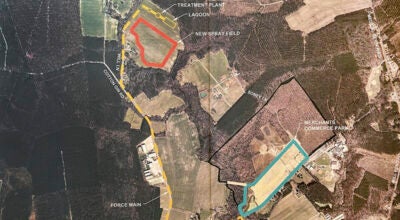ACP protest march begins Saturday
Published 10:34 am Thursday, March 2, 2017
PLEASANT HILL – A group opposed to the proposed Atlantic Coast Pipeline (ACP) will attempt to get their message across to the public over the course of a 15-day protest walk that opens near here Saturday.
The North Carolina Alliance to Protect Our People And The Places We Live (APPPL) is organizing the walk along the 205-mile proposed route of the pipeline in North Carolina. That walk begins at 8:30 a.m. on March 4 on US 301 in Northampton County at the North Carolina-Virginia state line.
Greg Yost, spokesperson for APPPL, said Saturday’s walk will cover a little over eight miles and end in Garysburg. The second leg will begin at 8:30 a.m. on Sunday and cover 13 miles, ending at the intersection of US 301 and NC 903 in Halifax County.
Those participating in the opening days of the walk can camp at the Franklinton Center near Whitakers. From there, they can leave their vehicles and ride a shuttle to the starting point of each day’s planned route. The shuttle will return to the campground at the end of the day’s walk.
The walk will end on Saturday, March 18 in Hamlet. Those choosing to participate can choose any or all of the 15 days, with different campgrounds Bailey, Parkton and Pembroke serving as points of overnight lodging.
“(The pipeline), if built, endanger water, homes and families, farms, schools, and churches close to the pipeline route,” said Yost in a press release. “It’s also a cornerstone of Duke Energy’s plan to build 12,000 MW of new gas-fired electrical generation in North Carolina.”
Yost added that the planned $5.5 billion, multi-state project will cross rivers, tear up mountains and national forests, go under public water supplies, and harm farmland and wetlands.
“It will bring toxic, dangerous gas from the fracked sacrifice zones of West Virginia into historically African-American and indigenous communities of eastern North Carolina,” Yost stated. “It will exacerbate global warming which just this year contributed to the worst flood in eastern North Carolina history and to drought and wildfires which ravaged the Appalachian Mountains in the west where 70,000 acres burned. And it will lead to even more Duke Energy control of environmental and energy policy in a state where fossil fuels are promoted and renewables are discouraged.”
Yost remarked that the walk is a first step in organizing North Carolina to stop the Atlantic Coast Pipeline.
“In the last few months, local and state level groups have decided that they are in this fight not merely to register frustration or defiance of Duke and the ACP, but to actually win. We are laying groundwork now for a campaign that touches all the bases: fact-based research, effective media work, coordination with national groups, creative legal challenges, and broad-based grassroots organizing for constituency influence,” he said.
Yost noted that the purpose of the walk is to organize two weeks of a continuous, traveling presence across the proposed route of the pipeline in the state.
“We will be sponsoring educational activities along the way in schools, churches, community centers, and city and county public officials’ offices,” he stated. “We will tell our stories to the media. The end of the walk will mark the beginning of an informed and active resistance to the Atlantic Coast Pipeline in eastern North Carolina, in the state as a whole, and around the country.”
As a part of the March 4 activities, Yost said there will be an orientation and training session, and then a rally, celebration and prayer ceremony to send the walkers off on their journey.
More information about the walk is available at www.2017acpwalk.org.
Dominion, Duke Energy, Piedmont Natural Gas and AGL Resources have partnered to build and own the proposed pipeline. Pending regulatory approval, the pipeline is expected to be in service in the fourth quarter of 2018.
The project includes a lateral extension that will branch off the main pipeline and travel northeast along the northern border of Northampton County before entering Virginia near Branchville. That extension will end in Chesapeake, VA.
Locally, the ACP project has received support of the Northampton County Board of Commissioners. In early February, that board approval special use permits that will allow the ACP partners to construct and staff an Operations Center as well as construct a compression station on a shared site near Pleasant Hill.
The Operation Center in Northampton County will serve as the main office for the entire pipeline – a 550-mile interstate natural gas pipeline that would serve multiple public utilities and their growing energy needs in Virginia and North Carolina. The pipeline originates in West Virginia and ends near Fayetteville.
The Operations Center will be approximately 6,600 square feet and will contain offices and conference rooms for nine full-time employees. Together, the office and compressor station will employ about 15-20 full-time employees.
The ACP project received an earlier endorsement from Northampton County officials. It also received resolutions of support from the Lake Gaston Regional Chamber of Commerce and Halifax County Business Horizons, Inc.



